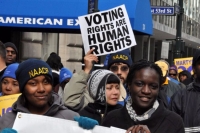Clinton as governor of Arkansas
In 1987, then-Governor Bill Clinton signed a bill affirming that one of the blue stars in the Arkansas state flag was meant to honor the Confederacy, whose entire purpose for existence was to perpetuate the institution of slavery. As governor, Clinton never once opposed the state’s multiple holidays celebrating the Confederacy:
Arkansas observes a Confederate Flag Day, which is celebrated together with Arkansas Confederate History and Heritage Month and Confederate Memorial Day. Per state code, it is observed on the Saturday immediately preceding Easter Sunday… Clinton did not publicly object to Confederate Flag Day during his time as governor. The holiday is still being observed.
While running for president, Clinton executed Ricky Ray Rector, an African-American inmate convicted of two murders who shot himself in the head, requiring a lobotomy and rendering him mentally handicapped. A judge ordered him to stand trial regardless of his mental state due to the murders, and Gov. Clinton ordered his execution while on the campaign trail, just before the New Hampshire primary. In his 2014 report, Capital Punishment: Race, Poverty, and Disadvantage, Yale professor Stephen Bright illustrated the depth of Rector’s mental instability:
That afternoon, after Clinton had refused all final entreaties for clemency, Rector sat with one of his attorneys watching, on a TV outside his cell, news reports of his impending execution, two hours away, intermingled with accounts of Clinton’s travail over the Flowers charges, and he abruptly announced, in a thick mumble, “I’m gonna vote for him, Gonna vote for Clinton.” It had always been his habit to put aside his dessert until bedtime, and after eating his last meal, of steak and fried chicken in gravy, with cherry Kool-Aid, he carefully set aside his helping of pecan pie, to finish later. One of his attorneys had earlier stated that Rector “thinks he’ll be back in his cell on Saturday morning.”
Bill Clinton’s first 4 years in the White House
Clinton’s indifference to minorities lasted throughout the presidential campaign and into his presidency. In fact, the 1992 Democratic Party platform made no mention of racial injustice for the first time in over 50 years, only briefly mentioning affirmative action and civil rights. And as Brooklyn College political science professor Corey Robin mentioned, Putting People First, the book Bill Clinton and Al Gore co-authored in 1992, only mentioned race once, when floating the idea of eliminating racial quotas.
In 1992, Clinton wasn’t afraid to admonish black people to their faces in order to appeal to white centrists, as he did in his infamous Sister Souljah moment. That was seen as a pivotal point in the campaign, in which Clinton called the female rapper to task for comments she made about race, particularly about how black people are incapable of racism, since racism is an institutional behavior that whites in power use to disenfranchise blacks. In his speech to the Rainbow Coalition, Clinton chastised Sister Souljah, even comparing her to KKK leader David Duke. For her part, Sister Souljah has remained relatively quiet since 1992, but recently blasted Hillary Clinton in an interview with TIME:
After being asked to weigh in on the candidacy of Hillary Clinton, Souljah raised concerned about being misquoted and then slid an index card to writer Daniel D’Addario which read: “She reminds me too much of the slave plantation white wife of the white ‘Master.’ She talks down to people, is condescending and pandering. She even talked down to the Commander in Chief, President Barack Obama, while she was under his command!”
In 1994, Bill Clinton passed the now-infamous crime bill, which even he has since admitted led to the mass incarceration problem we have today. The bill allocated an additional $30.2 billion for new state prisons, implemented harsher prison sentences, and created the three-strikes law, since adopted in 20 states, that mandates a life sentence after a third violent crime. Before the bill became law, Hillary Clinton was stumping ferociously for its passage:
“We will finally be able to say, loudly and clearly, that for repeat, violent, criminal offenders: three strikes and you’re out. We are tired of putting you back in through the revolving door,” First Lady Clinton had said.
By the end of Clinton’s first term, the U.S. had added an additional 277,000 prisoners — that’s more than twice as many prisoners added during Republican hero Ronald Reagan’s first term (129,000). By January 2001, Clinton oversaw the addition of 673,000 new inmates to state and federal prisons. Reagan had only imprisoned 438,000. Nearly 60 percent of those imprisoned during Clinton’s first four years were behind bars for nonviolent drug offenses. The crime bill had a reverberating effect throughout black communities — as prison spending went up, funding for programs meant to help the disadvantaged declined, according to Ohio State University law professor Michelle Alexander:
Federal funding for public housing fell by $17 billion (a 61 percent reduction) under Bill Clinton’s tenure; federal funding for corrections rose by $19 billion (an increase of 171 percent), according to Michelle Alexander’s seminal work, “The New Jim Crow: Mass Incarceration in the Age of Colorblindness.” The federal government’s new priorities redirected nearly $1 billion in state spending for higher education to prison construction. Clinton put a permanent eligibility ban for welfare or food stamps on anyone convicted of a felony drug offense (including marijuana possession).
Bill Clinton’s war on black welfare recipients and homeowners
Just as Clinton did with Sister Souljah in 1992, he once again catapulted himself to re-election in 1996 by using the black community as a stepping stone. Promising to “end welfare as we know it,” Clinton signed the Personal Responsibility and Work Opportunity Reconciliation Act (PRWORA) into law in August of 1996, just months before voters cast their ballots. The bill essentially turned the welfare system over to states, created loopholes for state governments to spend money earmarked for welfare on other programs, and disconnected welfare payments from inflation, meaning that families on welfare today get a full third less in assistance than they did 20 years ago.
As US Uncut previously reported, the PRWORA’s signing ceremony featured a black woman from Arkansas named Lillie Harden, who spoke about how proud she felt to have a job rather than depend on the welfare system. Even though only one in three welfare recipients are black, Clinton’s signing ceremony invitees perpetuated the myth of black people as the prime recipients of government welfare:
Harden’s life took a turn for the worse several years after PRWORA’s passage. In 2005, author Jason DeParle interviewed Harden for his book, The American Dream: Three Women, Ten Kids, and a Nation’s Drive to End Welfare. Since 1996, Harden had been struggling to make ends meet working low-wage jobs in the Arkansas town she lived in, where more than 1 in 5 residents live below the poverty line:
Harden had a stroke in 2002 and wanted me to ferry a message back to Clinton, asking if he could help her get on Medicaid. She had received it on welfare, but had been rejected now, and she couldn’t afford her $450 monthly bill for prescription drugs. More sad than bitter, she said of her work: “It didn’t pay off in the end.”
Near the end of his second term, Clinton signed the Financial Services Modernization Act (FSMA) into law in 1999. This bill infamously repealed the Glass-Steagall Act of 1933, which forced commercial banks and investment banks to operate separately. Clinton’s passage of the FSMA allowed major banks to acquire investment firms and insurance companies, which, as we all know by now, created the subprime mortgage bubble that disproportionately affected homeowners in communities of color.
With banks no longer constrained by Glass-Steagall, banks and non-bank mortgage lenders made loans to prospective homeowners, then sold the loans to investment banks that packaged them into collateralized debt obligations (CDOs) and mortgage-backed securities (MBS). Ratings agencies were also complicit, giving a AAA rating to these unregulated financial instruments which were then peddled to investors and traded on Wall Street, leading to the 2007-2008 financial crisis.
As the New York Times reported, banks used their newfound deregulation to aggressively push subprime loans onto black communities, like Baltimore. Shortly after Clinton’s deregulation passed, Wells Fargo went on a subprime crusade in Baltimore. Over half of all the Baltimore homes in foreclosure that had Wells Fargo loans between 2005 and 2008 are now vacant, and 71 percent of those homes are in black neighborhoods.
Tony Paschal, who was a Wells Fargo loan officer working out of Northern Virginia between 1997 and 2007, described the bank’s ruthless targeting of people of color:
In 2001, he states in his affidavit, Wells Fargo created a unit in the mid-Atlantic region to push expensive refinancing loans on black customers, particularly those living in Baltimore, southeast Washington and Prince George’s County, Md.
“They referred to subprime loans made in minority communities as ghetto loans and minority customers as ‘those people have bad credit’, ‘those people don’t pay their bills’ and ‘mud people,’ ” Mr. Paschal said in his affidavit.
He said a bank office in Silver Spring, Md., had an “affinity group marketing” section, which hired blacks to call on African-American churches.
“The company put ‘bounties’ on minority borrowers,” Mr. Paschal said. “By this I mean that loan officers received cash incentives to aggressively market subprime loans in minority communities.”
Hillary Clinton’s meddling in Haiti’s elections as Secretary of State
Haiti is the only sovereign nation founded by freed black slaves, making it the constant target of U.S. intervention for centuries. Shortly after the Haitian Revolution, slave owner Thomas Jefferson, then serving as the U.S. Secretary of State, worried about the future of France’s most profitable colony in a letter to Marquis de Lafayette in 1792:
What are you doing for your colonies? They will be lost if not more effectually succoured. Indeed no future efforts you can make will ever be able to reduce the blacks. All that can be done in my opinion will be to compound with them as has been done formerly in Jamaica.
Even over 200 years later, Hillary Clinton seems to have had the same colonialist attitude toward Haiti as her predecessors, given the depth of her involvement in the country’s democratic process.
As The Real News Network reported in the below video, Sec. Clinton used the State Department’s apparatus to team up with Haitian private sector elites to ensure that Haitian leadership was favorable to U.S. interests.
Haiti’s recent presidential election has been subject to mass protests throughout the country, with Haitian citizen groups and international election watchdogs condemning current president Michel Martelly’s rampant fraud in the initial casting of ballots, demanding the annulment of election results. Martelly is a good friend of the Clinton family — he even appointed Bill Clinton to an advisory board he assembled in seeking foreign investment.
Martelly has been president since 2010, ruling by decree, and without the consent of much of Haitian parliament. In fact, Jude Celestin, Martelly’s main opposition, recently announced he was dropping out of the election, calling the entire process a farce.
Despite the popular unrest, the U.S. government has spent at least $15 million on moving Haitian elections forward. Ricardo Seitenfus, who had been in Haiti serving as the representative for the Organization of American States since 2008, said “The Haitian electoral calendar is subject to the U.S. schedule.”
The depth of the Clinton State Department’s meddling in Haiti was made clear in one of Clinton’s recently-released emails. In the email, U.S. Ambassador to Haiti Kenneth Merten wrote a celebratory message to Cheryl Mills, Sec. Clinton’s chief of staff, saying that he had spoken with Haitian Chamber of Commerce president Reginald Boulos. The business elite told Boulos that Celestin would be withdrawing from the 2010 elections prior to the runoff. Merten even predicted Haitians would riot over the news.
Boulos + private sector have told RP that Celestin should withdraw + they would support RP staying til 7 Feb. Thoughts? This is big. Told Emb to draft statement calling for calm. I have called Martelly camp telling them that he needs to get on radio telling people to not pillage. Peaceful demo OK: pillage is not.
It’s undeniable to say the Clinton family has a legacy of proliferating white supremacy, whether its in domestic policy or foreign policy. It remains to be seen whether or not Hillary Clinton will attract black voters in the upcoming Democratic primaries, as the establishment media expects her to, or if black voters will look elsewhere for someone to adequately represent them.
Link to original article from US Uncut




 Imagine going to the polls on Election Day and discovering that your ballot could be collected and reviewed by the
Imagine going to the polls on Election Day and discovering that your ballot could be collected and reviewed by the ACLU Blueprints Offer Vision to Cut US Incarceration Rate in Half by Prioritizing 'People Over Prisons'
ACLU Blueprints Offer Vision to Cut US Incarceration Rate in Half by Prioritizing 'People Over Prisons'  "These disasters drag into the light exactly who is already being thrown away," notes Naomi Klein
"These disasters drag into the light exactly who is already being thrown away," notes Naomi Klein  How about some good news? Kansas Democratic Representative advances bill for Native Peoples.
How about some good news? Kansas Democratic Representative advances bill for Native Peoples.  What mattered was that he showed up — that he put himself in front of the people whose opinions on
What mattered was that he showed up — that he put himself in front of the people whose opinions on On a night of Democratic victories, one of the most significant wins came in Virginia, where the party held onto
On a night of Democratic victories, one of the most significant wins came in Virginia, where the party held onto A seismic political battle that could send shockwaves all the way to the White House was launched last week in
A seismic political battle that could send shockwaves all the way to the White House was launched last week in In an interview with Reuters conducted a month after he took office, Donald Trump asserted that the U.S. had “fallen
In an interview with Reuters conducted a month after he took office, Donald Trump asserted that the U.S. had “fallen Attorney General Jeff Sessions overturned the sweeping criminal charging policy of former attorney general Eric H. Holder Jr. and directed
Attorney General Jeff Sessions overturned the sweeping criminal charging policy of former attorney general Eric H. Holder Jr. and directed